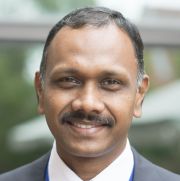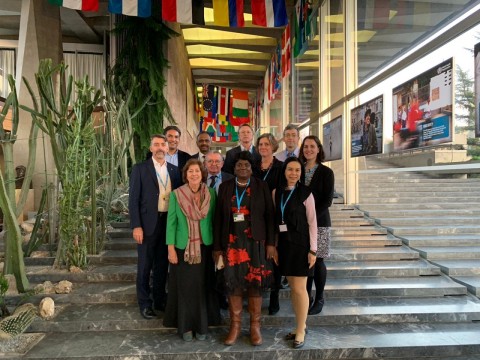Recently, Senthil Kumar Rajasekaran was invited by the World Health Organization (WHO) to be a part of a small working group of health professions education experts to develop a global competency framework for universal health coverage. As an alumnus of the 2013 “Leading Innovations in Healthcare and Education” course – who has also served as course faculty - we thought we would sit down with Senthil and ask him some questions about this meeting, his participation, the team’s recommendations and to learn about the global competency framework as it applies to health professions education
1) Can you share more about the WHO Universal Health Coverage and the Global Competency Framework?
By 2030, all United Nations (UN) Member States have agreed to try to achieve universal health coverage (UHC). By 2030, over 18 million additional health workers will be needed to meet the health workforce requirements of the universal health coverage targets. The Global Competency Framework for UHC is aimed at the development and dissemination of products that facilitate better alignment of student selection, education, and training with population, health systems, and health labor market needs; and that enable the scale up of socially accountable, professional, technical and vocational education in priority countries. The Framework focuses on the competencies and activities of health workers with a pre-service training pathway of 12-48 months. It relates to interventions across health promotion, prevention, treatment, rehabilitation and palliative care which are prioritized as part of WHO efforts to promote access to UHC through primary health care.
2) Can you provide more information about the meeting and the task for the working group?
I was honored to be invited to this working group where I was impressed at the level of commitment from academic leaders across the globe to meet the goals of UHC. As a person from the United States, I was impressed to see a great amount of focus on primary care, while our medical students increasingly strive for specialties. Facilitated by the WHO leads on this project, Siobhan Fitzpatrick and Ibadat Dhillon, for two days the 9 participants from multiple WHO regions brainstormed on articulating the competencies that all health workers must possess as well as listing and grouping the specific activities/tasks that a subset of health workers must be able to perform by the end of the training. The process began months before the meeting with a larger group of educators from around the world weighing in on the draft versions that were electronically circulated in an iterative manner. The final working draft was shared with the invited members of the working group that was tasked with reviewing the document before the meeting and at the meeting refining the overall structure, grouping, wording and description of competencies.
3) What part of the Harvard Macy Institute “Leading Innovations in Healthcare and Education” course resonated with you as a part of this experience?
I remember Liz Armstrong and Clay Christensen highlighting that relying on physicians to solve population health needs is an unsustainable model. Other speakers also presented models involving allied health workers to address specific population health needs. While those were mere predictions in 2013, it was great to see those predictions turn into implementation on a global scale. The emphasis the leadership course makes on education as a key lever for change was quite relevant as the group at WHO designed educational interventions to solve a major healthcare need at a global scale. Another relevant aspect of the leadership course was how Liz and Clay talked about multiple entry and exit points in health professions education courses. The model currently being explored in this WHO initiative allows for healthcare workers to possess competencies that progressively increase over time and experience. This allows for someone to exit the education track, enter into a limited scope of practice and return to education/training for expanding their scope of practice.
4) Can interested members of the Harvard Macy Institute community get involved in this project?
Yes, absolutely! The Global Health Workforce Network (GHWN) has an education hub that serves as a virtual community of educators brainstorming on educational interventions to meet the 2030 UHC goals.
The GHWN Education Hub has been reviewing and commenting on an updated draft of the Global Competency Framework for Universal Health Coverage, both through the discussion forums and via one of the Education Hub conference calls in November and December. This builds on earlier input from the Education Hub, as well as iterative development and stakeholder and expert consultation through forums including the Towards Unity for Health Network (TUFH) and The African Forum for Research and Education in Health (AFREhealth). Feedback has been received on the format, implementation and content. The meeting that I attended in early December was to review the feedback and advice. The WHO will continue to seek feedback and share iterative development of content with the GHWN Education Hub on an ongoing basis. The GHWN Education Hub welcomes interested Harvard Macy Institute community members to join the other educators, practitioners and policy makers from around the world. To join the Hub, click here.
5) Any final thoughts about your involvement in the working group?
I am really excited about the scope of health professions education in general and grateful for the people at the WHO for passionately advocating for the healthcare needs of some of the most vulnerable populations in the world. I understand that for right reasons, physician training is complex, expensive and highly regulated. This underlines the need for thinking out of the box and current constraints if the world needs to meet the goals of UHC. Coming from India and having been exposed to pressing healthcare needs of developing countries, I remain optimistic about the current regional and global efforts to address the basic healthcare needs of vulnerable populations through redesign of healthcare provision and education. Having been to the meeting, I also understand the highly complex political and economic considerations that go into prioritization of population health. I was reassured that culture and context are two important things we need to consider before implementing any new ideas or change. What could be very successful in one context or culture could prove to be the worst thing in other settings. I also strongly encourage the HMI community to consider joining the GHWN Education hub as there is a wealth of intelligence in this group that the global community will benefit from.
Did you know that the Harvard Macy Institute Community Blog has had more than 150 posts? Previous posts included interviews with Harvard Macy Institute faculty including Victoria Brazil, Eric Holmboe, and Louis Pangaro.
Senthil Kumar Rajasekaran, MD



